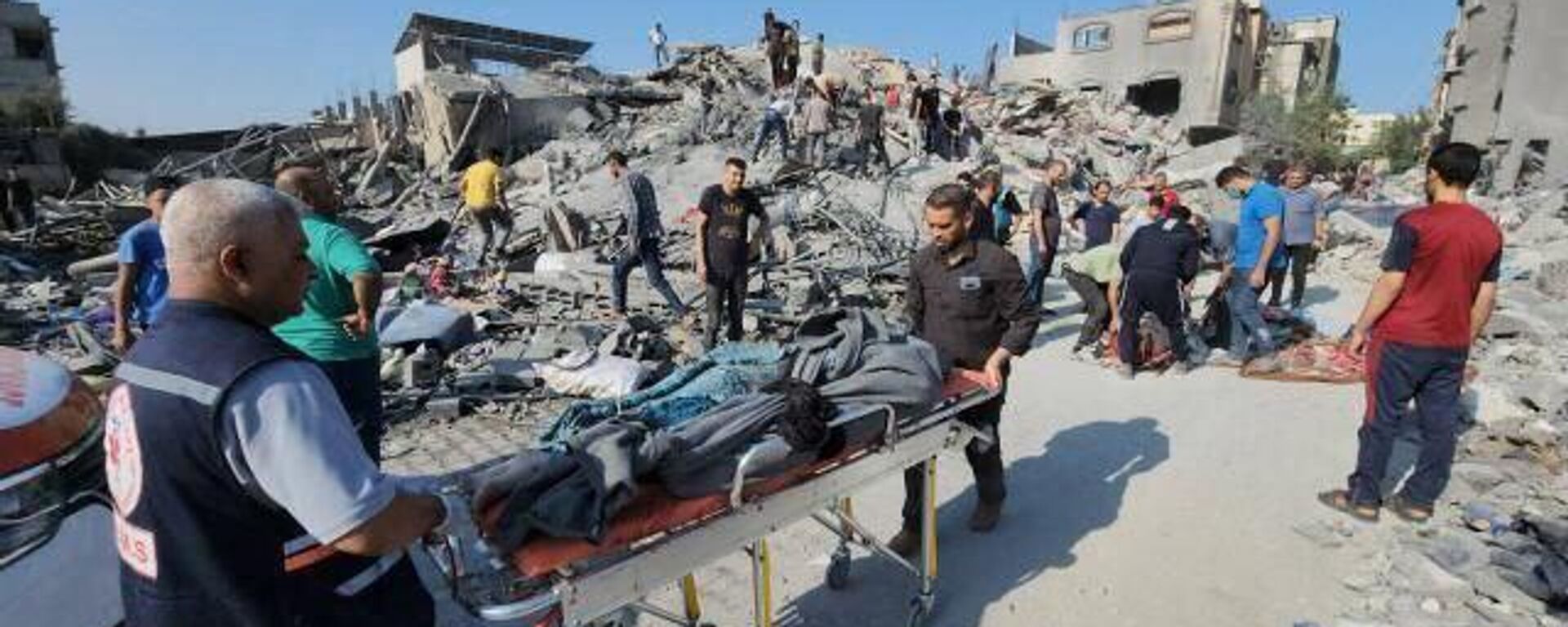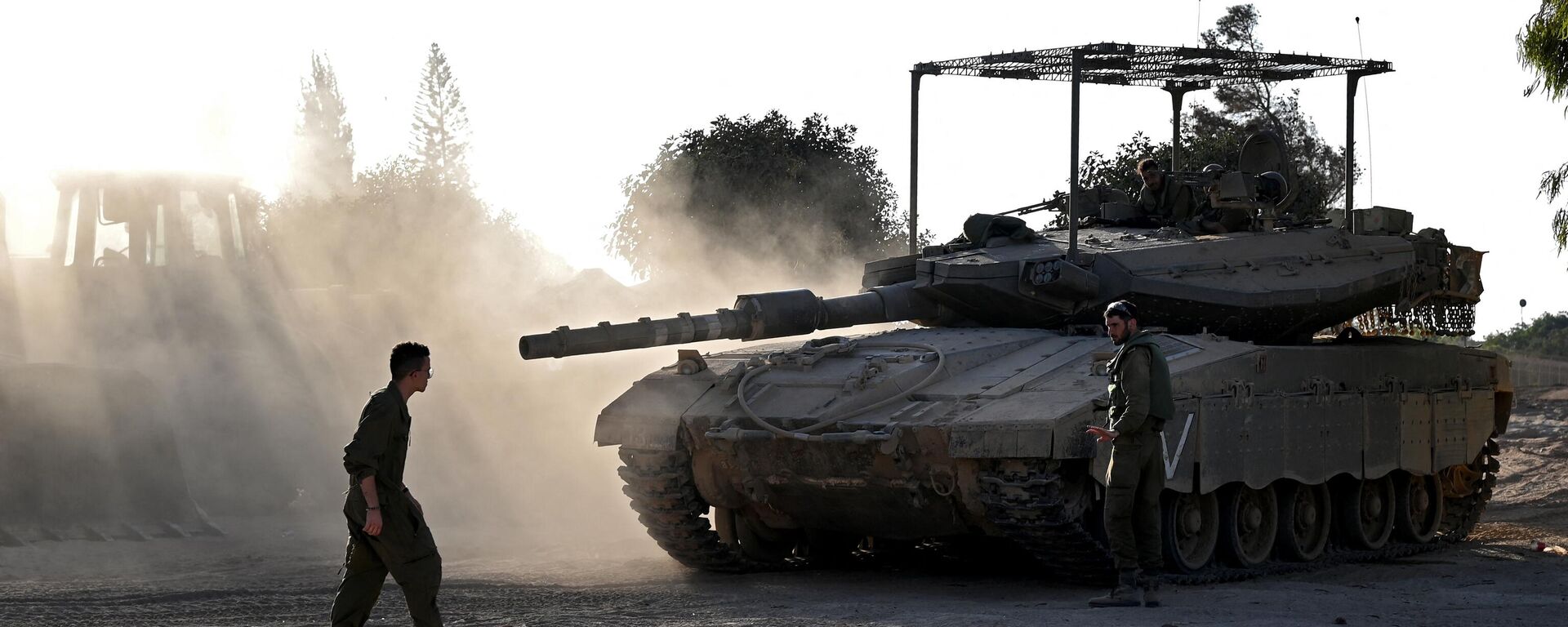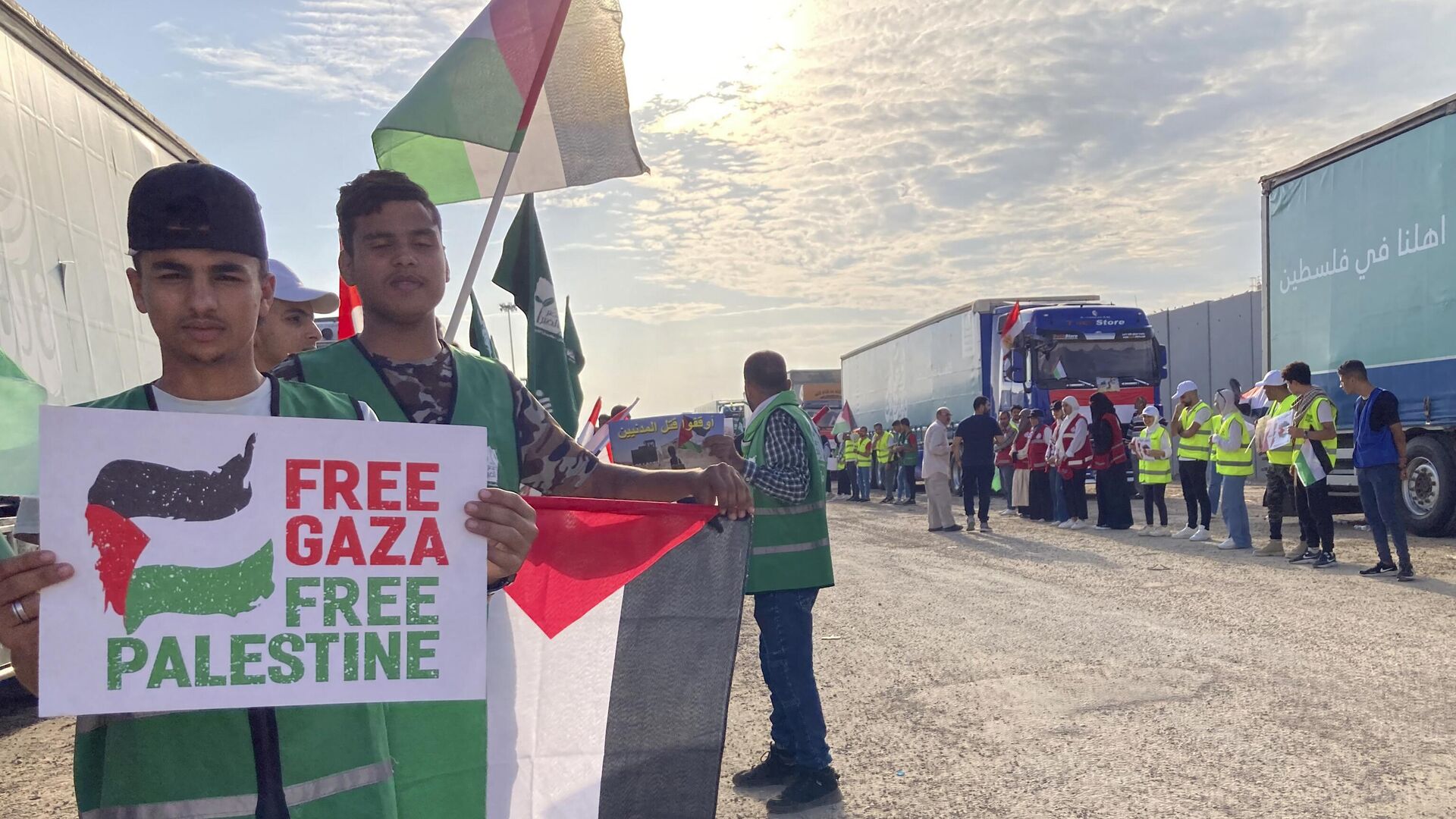https://sputnikglobe.com/20231111/despite-dark-future-young-palestinians-choose-to-resist-israel-by-not-fleeing-1114881996.html
Despite Dark Future, Young Palestinians Choose to Resist Israel by Not Fleeing
Despite Dark Future, Young Palestinians Choose to Resist Israel by Not Fleeing
Sputnik International
As thousands of civilians on both sides of the border between Israel and the Gaza Strip continue to perish in the ongoing military conflict, a Palestinian activist based in the West Bank explained to Sputnik why they view Israel's presence in both Gaza and the West bank as occupation.
2023-11-11T07:18+0000
2023-11-11T07:18+0000
2023-11-11T07:24+0000
world
palestine-israel conflict
israeli-palestinian conflict
israel-gaza conflict
gaza strip
hamas
israel defense forces (idf)
west bank
israel
https://cdn1.img.sputnikglobe.com/img/07e7/0b/01/1114635037_0:0:3072:1728_1920x0_80_0_0_87f6f6a5ad12ec9838fa327059b6beeb.jpg
The activist also recalled how Israeli policies fermented resentment among Palestinians that contributed to the recent spike in violence.Childhood Trauma Under a 1993 peace agreement known as the Oslo Accords, Israel agreed to fulfill the right of the Palestine people to self-determination by allowing limited Palestinian self-governance over parts of the West Bank and Gaza. Reminiscing about his childhood, human rights activist Muhanned Qafesha told Sputnik that his fellow Palestinians never really felt disburdened of Israeli occupation despite the promise of self-determination and self-governance. "I have lived under Israeli occupation, Israeli aggression and Israeli brutality. I've witnessed all kinds of Israeli violence. I've seen all kinds of Israeli aggression during my childhood. I grew up seeing military tanks raiding the neighborhoods in Hebron, where Israeli soldiers were raiding Palestinian homes, attacking Palestinians, shooting at Palestinians and killing them. I've seen Israeli choppers and F-16s [fighter jets] bombing people's homes," Qafesha recalled. He said growing up through such experiences it was only natural for him to want to become an activist advocating for the basic rights of Palestinians. "As a person growing up in such a situation, that makes you want to fight for your freedom. It's a very normal reaction to fight back. That's why I decided to join a movement called Youth Against Settlement, which is a non-violent movement. I also studied journalism to talk about the sufferings of Palestinians and to deliver the message of Palestinians to the rest of the world. I want everybody around the world to know what's happening to Palestinians. I want our kids not to suffer the same trauma as we experienced as children," Qafesha said. Open-Air PrisonThe West Bank and the Gaza Strip are often described as open-air prison, as Israel keeps a tight grip over the movement of people and goods in both Palestinian areas. Without access to an airport, Palestinians have no other avenue to leave but to request permission from Israeli authorities to cross into neighboring countries by land — Egypt for the Gaza Strip and Jordan for the West Bank. "The condition at the land border with Jordan is also crazy for Palestinians. It's not open 24 hours. We can only go and come back during the five hours when it's open. And they usually only allow 500 people to pass each day. If 500 people have crossed the border in two hours, they would close the border for the day. If you're coming back from a trip to Europe and your flight arrived at 9 p.m., you have to spend the night in Amman [Jordan's capital] and wait until the next morning when the border reopens to return to your city. This is how they work," Qafesha said. As someone who grew up in the West Bank, Qafesha has never visited the Gaza Strip because of Israel’s control of the borders of both territories. Without the freedom of movement, young Palestinians have limited career options despite being well-educated and often resort to low-end jobs like construction, the activist said. As a result, many young Palestinians feel hopeless about their future, he added. "It's a huge pressure on people. There's no future for people living in Palestine. You see the future as very dark as a young person. You're not doing what other young people in the world are doing, which is dreaming, working and enjoying your time traveling. For young Palestinians, this doesn't exist. For young Palestinians, the future is very dark and the present is very tough. You never live in a moment when your mind is peaceful. You can't do art, practice something you love and achieve your dreams. Some of the kids in Gaza are gamers. They want to reach a certain amount of followers. But they're being killed with their families in their homes," Qafesha said. Lost Faith in International CommunityIn response to the surprise attack carried out by the Palestinian movement Hamas on Israel on October 7, Israel put the Gaza Strip under a blockade and launched retaliatory strikes which later expanded into a full-fledged ground operation. While most of Western countries expressed solidarity with Israel and shied away from criticizing Israel's harsh military response that killed thousands of Palestinian civilians. "Israel is being protected by the West. For us now, the Western governments are appearing as liars in front of the whole world. They would support the oppressed if they hate the oppressor and they're not friends with the oppressor. But if the oppressor is a friend of theirs, they'll be OK with it. It depends on how much they like or hate the oppressor. Israel did terrible things to the Palestinians. You're giving them legitimacy in the world," Qafesha said. As someone who advocated for peaceful resistance, Qafesha explained that he understood why some Palestinians chose the path of armed resistance. "It is because Palestinians have lost faith in the international community in solving this occupation. I think the Israeli government should take the blame, because when they had a chance to give a solution to the Palestinians, they turned their back against the Palestinians. They ignored us. They should take the blame for everything that's happening here," he said. On November 5, Israel announced that its ground forces advanced deep into the north of the Gaza Strip, up to the coast, effectively splitting the Palestinian exclave into two halves. The Israel Defense Forces has been urging Gazans to evacuate from the north to the south, promising to keep an evacuation "corridor" open. "Many Palestinians chose to stay in their home and die. But they didn't want to leave their homes and become refugees again. We don't want to go anywhere. When we go to Egypt, we want to go for a fun trip and come back. We don't want to leave," Qafesha said. The activist explained that choosing to stay in their homes was already a form of resistance for Palestinians. "For Palestinians, being in this land and choosing not to leave is a kind of resistance. You don't have to do anything or say that you're resisting. Just living in your home and continue to live is a form of resistance. That's why all Palestinians are resisting Israeli occupation because they refuse to leave," Qafesha said.
https://sputnikglobe.com/20231010/roots-of-israel-hamas-conflict-1114064324.html
https://sputnikglobe.com/20231109/israels-fight-with-hamas-just-a-pretext-for-ethnic-cleansing-in-gaza---ex-marine-1114845933.html
https://sputnikglobe.com/20231105/why-israel-is-loosing-opportunity-to-beat-hamas---ritter-1114733462.html
gaza strip
west bank
israel
Sputnik International
feedback@sputniknews.com
+74956456601
MIA „Rossiya Segodnya“
2023
Sputnik International
feedback@sputniknews.com
+74956456601
MIA „Rossiya Segodnya“
News
en_EN
Sputnik International
feedback@sputniknews.com
+74956456601
MIA „Rossiya Segodnya“
Sputnik International
feedback@sputniknews.com
+74956456601
MIA „Rossiya Segodnya“
israel-gaza conflict, israel-hamas war, gaza strip crisis, crisis middle east, palestine
israel-gaza conflict, israel-hamas war, gaza strip crisis, crisis middle east, palestine
Despite Dark Future, Young Palestinians Choose to Resist Israel by Not Fleeing
07:18 GMT 11.11.2023 (Updated: 07:24 GMT 11.11.2023) MOSCOW (Sputnik), Tommy Yang - As thousands of civilians on both sides of the border between Israel and the Gaza Strip continue to perish in the ongoing military conflict, a Palestinian activist based in the West Bank explained to Sputnik why they view Israel's presence in both Gaza and the West bank as occupation.
The activist also recalled how Israeli policies fermented resentment among Palestinians that contributed to the recent spike in violence.
Under a 1993 peace agreement known as the Oslo Accords, Israel agreed to fulfill the right of the Palestine people to self-determination by allowing limited Palestinian self-governance over parts of the West Bank and Gaza.
Reminiscing about his childhood, human rights activist Muhanned Qafesha told Sputnik that his fellow Palestinians never really felt disburdened of Israeli occupation despite the promise of self-determination and self-governance.
"I have lived under Israeli occupation, Israeli aggression and Israeli brutality. I've witnessed all kinds of Israeli violence. I've seen all kinds of Israeli aggression during my childhood. I grew up seeing military tanks raiding the neighborhoods in Hebron, where Israeli soldiers were raiding Palestinian homes, attacking Palestinians, shooting at Palestinians and killing them. I've seen Israeli choppers and F-16s [fighter jets] bombing people's homes," Qafesha recalled.
10 October 2023, 13:29 GMT
He said growing up through such experiences it was only natural for him to want to become an activist advocating for the basic rights of Palestinians.
"As a person growing up in such a situation, that makes you want to fight for your freedom. It's a very normal reaction to fight back. That's why I decided to join a movement called Youth Against Settlement, which is a non-violent movement. I also studied journalism to talk about the sufferings of Palestinians and to deliver the message of Palestinians to the rest of the world. I want everybody around the world to know what's happening to Palestinians. I want our kids not to suffer the same trauma as we experienced as children," Qafesha said.
The West Bank and the Gaza Strip are often described as open-air prison, as Israel keeps a tight grip over the movement of people and goods in both Palestinian areas. Without access to an airport, Palestinians have no other avenue to leave but to request permission from Israeli authorities to cross into neighboring countries by land — Egypt for the Gaza Strip and Jordan for the West Bank.
"The condition at the land border with Jordan is also crazy for Palestinians. It's not open 24 hours. We can only go and come back during the five hours when it's open. And they usually only allow 500 people to pass each day. If 500 people have crossed the border in two hours, they would close the border for the day. If you're coming back from a trip to Europe and your flight arrived at 9 p.m., you have to spend the night in Amman [Jordan's capital] and wait until the next morning when the border reopens to return to your city. This is how they work," Qafesha said.
As someone who grew up in the West Bank, Qafesha has never visited the Gaza Strip because of Israel’s control of the borders of both territories.

9 November 2023, 18:35 GMT
Without the freedom of movement, young Palestinians have limited career options despite being well-educated and often resort to low-end jobs like construction, the activist said. As a result, many young Palestinians feel hopeless about their future, he added.
"
It's a huge pressure on people. There's no future for people living in Palestine. You see the future as very dark as a young person. You're not doing what other young people in the world are doing, which is dreaming, working and enjoying your time traveling. For young Palestinians, this doesn't exist. For young Palestinians, the future is very dark and the present is very tough. You never live in a moment when your mind is peaceful. You can't do art, practice something you love and achieve your dreams. Some of the kids in Gaza are gamers. They want to reach a certain amount of followers. But they're being killed with their families in their homes," Qafesha said.
Lost Faith in International Community
In response to the surprise attack carried out by the Palestinian movement Hamas on Israel on October 7, Israel put the Gaza Strip under a blockade and launched retaliatory strikes which later expanded into a full-fledged ground operation. While most of Western countries expressed solidarity with Israel and shied away from criticizing Israel's harsh military response that killed thousands of Palestinian civilians.
"
Israel is being protected by the West. For us now, the Western governments are appearing as liars in front of the whole world. They would support the oppressed if they hate the oppressor and they're not friends with the oppressor. But if the oppressor is a friend of theirs, they'll be OK with it. It depends on how much they like or hate the oppressor. Israel did terrible things to the Palestinians. You're giving them legitimacy in the world," Qafesha said.

5 November 2023, 08:22 GMT
As someone who advocated for peaceful resistance, Qafesha explained that he understood why some Palestinians chose the path of armed resistance.
"It is because Palestinians have lost faith in the international community in solving this occupation. I think the Israeli government should take the blame, because when they had a chance to give a solution to the Palestinians, they turned their back against the Palestinians. They ignored us. They should take the blame for everything that's happening here," he said.
On November 5, Israel announced that its ground forces advanced deep into the north of the Gaza Strip, up to the coast, effectively splitting the Palestinian exclave into two halves. The Israel Defense Forces has been urging Gazans to evacuate from the north to the south, promising to keep an evacuation "corridor" open.
"Many Palestinians chose to stay in their home and die. But they didn't want to leave their homes and become refugees again. We don't want to go anywhere. When we go to Egypt, we want to go for a fun trip and come back. We don't want to leave," Qafesha said.
The activist explained that choosing to stay in their homes was already a form of resistance for Palestinians.
"For Palestinians, being in this land and choosing not to leave is a kind of resistance. You don't have to do anything or say that you're resisting. Just living in your home and continue to live is a form of resistance. That's why all Palestinians are resisting Israeli occupation because they refuse to leave," Qafesha said.




